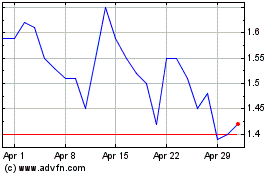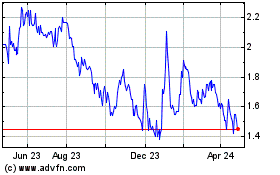Zenyatta; Experts Establish First Geological Model at Lakehead
University for One-of-a-Kind Albany Graphite Deposit; Government of
Canada Grant Awarded to Carry Out Additional Research
THUNDER BAY, ONTARIO--(Marketwired - Feb 4, 2014) - Zenyatta
Ventures Ltd. ("Zenyatta" or "Company") (TSX-VENTURE:ZEN) is
pleased to report on recent geological research at Lakehead
University in Thunder Bay on the Company's unique Albany graphite
deposit. The unusual mode of formation, through igneous
hydrothermal processes, accounts for the superior purity and
crystallinity of graphite found in this 'one of a kind'
deposit.
Also, the Government of Canada has awarded a collaborative
research grant through the Natural Sciences and Engineering
Research Council ('NSERC') to assist Dr. Andrew Conly (associate
professor, Department of Geology at Lakehead University) in
carrying out further studies on the unique Albany graphite deposit.
This is in addition to the support Zenyatta recently received from
the National Research Council of Canada Industrial Research
Assistance Program for metallurgical testing.
Dr. Andrew Conly observed, "Evidence has shown that Zenyatta has
discovered a unique sub-class of a hydrothermal graphite deposit
unlike any other. Igneous breccia-hosted graphite deposits like
Albany are very rare, and to the best of my knowledge, none are
currently being mined or even in an advanced stage of exploration
globally. Our on-going research of the Albany deposit will
establish the first genetic model for this distinctive type of
graphite. I would like to thank NSERC for their recent important
contribution in assisting myself and students at Lakehead
University during further development of this geological
model."
Diagrams showing the various stages of geological deposition can
be found at www.zenyatta.ca under 'Graphite Project'.
In contrast to more commonly occurring flake and amorphous
graphite deposits, the unusual hydrothermal style in the Albany
deposit can be processed, at a cost advantage, to yield high
purity, crystalline graphite ideally suited for advanced high-tech
applications. The world trend is to develop products for
technological applications that need extraordinary performance
using ultra-high purity graphite powder at an affordable cost. High
purity is gaining prominence at a time when Zenyatta discovered a
very rare, (hydrothermal) graphite deposit, which can be upgraded
to 99.99% carbon ('C') with very good crystallinity without the use
of aggressive acids and high thermal treatment. The development of
this deposit would place Zenyatta in a strong position to compete
in specialised markets such as those currently supplied by
high-cost synthetic graphite. When combined with a large, discrete
ultra-high purity graphite deposit and the growth potential of
these markets, the substantial potential of the Albany graphite
deposit becomes quite evident.
Dr. Conly stated, "The preliminary genetic model (as presented
in the NI 43-101 Technical Report, Jan 2014) had to account for
Albany's key attributes, including: 1) highly pure and crystalline
graphite; 2) brecciated (volcanic-hosted) pipes, consisting of both
angular & rounded fragments; and, 3) simple mineralogy (i.e.
essentially graphite, quartz & feldspar) with minimal
alteration associated with graphite deposition. Our research at
Lakehead University is working on characterizing the nature of the
graphite forming fluid (i.e. carbon dioxide CO2 versus methane
CH4). Such information is crucial for developing a comprehensive
and well-constrained genetic model for this uncommon type of
graphite mineralization."
Dr. Conly also noted that, "The far more common flake type
(sedimentary) graphite deposits form through a completely different
geological process. Flake graphite commonly occurs globally in
metasedimentary rocks as a result of the conversion of organic
matter through regional or contact metamorphism. Graphitization of
organic matter is well understood to be due to heating and
compression of organic matter in situ over a long period of time
and this process results in graphite that contains various
impurities."
Peter Wood, VP Exploration for Zenyatta, commented, "Dr. Conly
has been involved in the study of the Albany graphite deposit since
Zenyatta's initial discovery drill hole in 2011. He was one of the
first to recognize the geological significance and the economic
importance of such a find. Academic work completed under Dr.
Conly's supervision has considerably increased our understanding of
the geological processes required for formation, and confirms that
the Albany graphite deposit is not like any other graphite
occurrence previously discovered or documented. It represents a
unique geological setting that has led to the formation of highly
crystalline graphite of unusually high purity."
A high degree of crystallinity and purity results in various
positive qualities that graphite is known for such as electrical
conductivity, thermal conductivity, compressibility, dimension
stability, bending strength and lubricity. These qualities are very
important for emerging high-tech or clean-tech applications. The
highest quality material of ultra-high purity (>99.95% C)
graphite will demand a premium price in the range of $5,000 -
$25,000 per tonne depending on the application.
Others like synthetic graphite producers and upgraded flake
producers (including China) are faced with escalating energy costs
associated with turning petroleum (needle) coke or flake graphite
into high purity powder. It requires extensive thermal treatment
(up to 3000°C) and/or aggressive acid treatment. Not only is this a
costly process for others but it also has associated environmental
issues.
Somewhat simplified, there are three (3) different processes
leading to the formation of graphite deposits. Natural graphite
material has varying levels of quality depending on the type
(amorphous, flake or hydrothermal). The degree of purity can vary
greatly, which heavily influences the use of the material in
applications and its pricing:
1. Amorphous (Sedimentary) graphite is derived from the
metamorphism of coal deposits. Graphite formed under these
conditions is characterized by incomplete structural ordering,
abundant impurities and low crystallization, resulting in low value
"amorphous" graphite with its main market in foundry
applications.
2. Flake (Sedimentary) graphite is the metamorphism of organic
material. The formation of these deposits involves sedimentation
and then alteration of carbonaceous organic matter to graphite
during regional metamorphism containing abundant impurities.
Upgrading of graphite from this deposit type is complex and costly
as a result of processing using aggressive acids and/or thermal
treatment.
3. Hydrothermal (Volcanic) graphite deposits. The formation of
these deposits is associated with migrating supercritical
carbon-bearing (C-O-H) fluids or fluid-rich magmas associated with
igneous (or volcanic) activity. The formation of the carbon-bearing
fluids is most often a consequence of high temperature
metamorphism, but magmatic degassing can also produce graphite.
Fluid precipitated graphite is well-ordered and can be a source of
highly valued crystalline or vein-type graphite.
The Albany graphite deposit is a unique example of a
hydrothermal graphite deposit in which a large volume of highly
crystalline, fluid-deposited graphite occurs within an igneous
host. The deposit is interpreted as a vent pipe breccia that formed
from CO2-rich fluids that evolved due to pressure-related degassing
of syenites of the Albany Alkalic Complex (Conly, 2014). A more
detailed explanation can be found in the NI 43-101 Technical Report
dated 16 January 2014 under the section 'Deposit Type' filed on
www.sedar.com.
Zenyatta continues to develop its 100% owned Albany Graphite
Deposit located in northeastern Ontario, Canada. The Company's
graphite deposit is located 30 km north of the Trans-Canada
Highway, power line and natural gas pipeline near the communities
of Constance Lake First Nation and Hearst. A rail line is located
70 km away with an all-weather road approximately 4-5 km from the
graphite deposit.
The outlook for the global graphite market is very favourable
with demand growing rapidly from new applications. It is now
considered one of the more strategic elements by many leading
industrial nations, particularly for its growing importance in high
technology manufacturing and in the emerging "green" industries
such as electric vehicle components and energy storage. The
application for graphitic material is constantly evolving due to
its unique chemical, electrical and thermal properties. It
maintains its stability and strength under temperatures in excess
of 3,300°C and is very resistant to chemical corrosion. It is also
one of the lightest of all reinforcing elements and has high
natural lubricating abilities. Some of these key physical and
chemical properties make it critical to modern industry.
Mr. Peter Wood, P.Geo., Zenyatta Ventures Ltd., Vice President
Exploration, is the "Qualified Person" under National Instrument
43-101 and has reviewed and approved the technical information
contained in this news release. To find out more on Zenyatta
Ventures Ltd., please visit website www.zenyatta.ca.
Neither TSX Venture Exchange nor its Regulation Services
Provider (as that term is defined in the policies of the TSX
Venture Exchange) accepts responsibility for the adequacy or
accuracy of this release. This News Release includes certain
"forward-looking statements", which often, but not always, can be
identified by the use of words such as "believes", "anticipates",
"expects", "potential", "estimates", "may", "could", "would",
"will", or "plan". These statements are based on information
currently available to Zenyatta and Zenyatta provides no assurance
that actual results will meet management's expectations.
Forward-looking statements include estimates and statements with
respect to Zenyatta's future plans, objectives or goals, to the
effect that Zenyatta or management expects a stated condition or
result to occur, including in this News Release. Since
forward-looking statements are based on assumptions and address
future events and conditions, by their very nature they involve
inherent risks and uncertainties. Actual results relating to, among
other things, results of exploration, project development,
reclamation and capital costs of Zenyatta's mineral properties, and
Zenyatta's financial condition and prospects, could differ
materially from those currently anticipated in such statements for
many reasons such as: changes in general economic conditions and
conditions in the financial markets; changes in demand and prices
for minerals; litigation, legislative, environmental and other
judicial, regulatory, political and competitive developments;
technological and operational difficulties encountered in
connection with Zenyatta's activities; and other matters discussed
in this News Release and in filings made with securities
regulators. This list is not exhaustive of the factors that may
affect any of Zenyatta's forward-looking statements. These and
other factors should be considered carefully and readers should not
place undue reliance on Zenyatta's forward-looking statements.
Zenyatta does not undertake to update any forward-looking statement
that may be made from time to time by Zenyatta or on its behalf,
except in accordance with applicable securities laws.
Zenyatta Ventures
Ltd.807-346-1660info@zenyatta.cawww.zenyatta.ca
Zentek (TSXV:ZEN)
Historical Stock Chart
From Nov 2024 to Dec 2024

Zentek (TSXV:ZEN)
Historical Stock Chart
From Dec 2023 to Dec 2024
